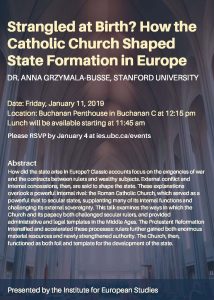
January 11, 2019
12:15-1:45
Buchanan Penthouse
Anna Grzymala-Busse, Stanford University
“Strangled at Birth? How the Catholic Church Shaped State Formation in Europe”
Abstract – How did the state arise in Europe? Classic accounts focus on the exigencies of war and the contracts between rulers and wealthy subjects. External conflicts and internal concessions, then, are said to shape the state. These explanations overlook a powerful internal rival: the Roman Catholic Church, which as a powerful rival to secular states, supplanting many of its internal functions and challenging its external sovereignty. This talk examines the ways in which the Church and its papacy both challenged secular rulers, and provided administrative and legal templates in the Middle Ages. The Protestant Reformation intensified and accelerated these processes: rulers further gained both enormous material resources and newly strengthened authority. The Church, then, functioned as both foil and template for the development of the state.
Bio – Anna Grzymala-Busse is professor in the Department of Political Science at Stanford University. She is the Michelle and Kevin Douglas Professor of International Studies and Senior Fellow at Freeman Spogli Institute for International Studies. Her research interests include political parties, state development and transformation, informal political institutions, religion and politics, and post-communist politics. Gryzmala-Busse’s research has examined the paradox of communist successor parties in East Central Europe; the role of political parties and party competition in the reconstruction of the post-communist state; and her most recent book project, Nations Under God, examines why some churches have been able to wield enormous policy influence.